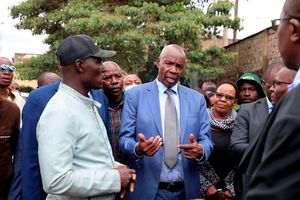Grow it, mine it, build it, or invent it: For Aga Khan University, books are the best way to curate change in civil society

An artist's impression of the Graduate Professional Education Campus, which will house graduate schools for Media and Communications; Leadership and Management; Hospitality, Leisure and Tourism; and an Executive Education Centre. PHOTO | NATION MEDIA GROUP
What you need to know:
- The job market says regional universities are producing unemployable graduates.
- While many institutions of higher learning provide knowledge, Aga Khan University seeks to go two steps further and provide understanding and application as well.
- The Aga Khan said Tanzania was a special place for AKU since his grandfather, while serving as Imam of the Ismaili Muslim community, made education a top priority and started the first Aga Khan School in Africa over 110 years ago in Bagamoyo.
On February 23 this year, Tanzanian President Jakaya Kikwete granted a charter to the Aga Khan University — making it the first foreign institution of higher learning in the country.
Mr Kikwete, while handing the certificate to the Aga Khan at a ceremony held at State House in Dar es Salaam, said that, for years, the Government of Tanzania had enjoyed a cordial relationship with the Aga Khan Development Network (AKDN) — which runs the university and other Aga Khan projects in the country — and added that there was room to do more.
The granting of the charter, Mr Kikwete said, opened a new chapter in improving the work carried out made by the AKDN and the government of Tanzania to improve the lives of residents.
However, he stressed, the charter was not just given out to the institution, but was a well-deserved achievement.

Aga Khan University's chancellor, The Aga Khan, gives a speech as he conferred diplomas and bachelor's degrees in Nursing and Master of Medicine to graduates during the institution's 15th anniversary of its presence in East Africa on March 2, 2015. PHOTO | BILLY MUTAI
HEALTHY CIVIL SOCIETY
That brief ceremony in Dar es Salaam opened up a world of possibilities for the region while at the same time giving more impetus to the AKDN’s drive to improve the quality of life for (particularly) East Africans.
The Aga Khan himself believes that the quality of life in East Africa would improve if civil society embraced quality and was more ethical, and this is driving the university’s bold expansion in the region.
“More and more, I am convinced that the key to improving the quality of human life — both in places that are gifted with good governments and in places that are not so fortunate — is the quality of what I describe as civil society,” says the Aga Khan.

Some of the graduates during the Aga Khan University graduation ceremony on March 2, 2015 PHOTO | BILLY MUTAI
He defines civil society as an array of institutions which are neither public nor profit-driven, but which are motivated by voluntary commitments and dedicated to the public good.
“They include institutions dedicated to culture, to public information, to the environment and to religious faith. And they include, very importantly, the fields of health and education.”
The hereditary spiritual leader of the Shia Ismaili Muslims, holds that quality civil society organisations are critical if human life across the world, but especially in the developing world, is to be improved.
A healthy civil society, he says, is a meritocratic one where ethics are honoured and excellence is valued. As such, he adds, “the great question confronting us here in Africa is how rapidly the institutions of a healthy civil society can be established and reinforced”.
This is a question he, as chancellor of the university, has assigned AKU to help solve as it advances and shares new knowledge.
The university has announced a $1.1 billion (Sh100 billion) expansion plan, the largest private investment in higher education in EA’s history. The expansion will spread to five countries and will include the establishment of eight graduate schools.
Riding the bullish youth bulge, EA is witnessing a pronounced quest for university education.
INTELLECTUAL ACCOMPLISHMENT

Aga Khan University's chancellor, The Aga Khan (right), awards a Bachelor of Science in Nursing degree to Roseline Akinyi Haya during the 15th anniversary of the university's presence in East Africa on March 2, 2015. PHOTO | BILLY MUTAI
This manifests in the multitudes of energetic youth who pour onto the streets of its cities every evening trekking from evening classes, and the millions of dollars coming from entrepreneur pockets to set up private colleges.
But where there is a rush, quality suffers, and this may just be the differentiating niche for AKU.
The Aga Khan said Tanzania was a special place for AKU since his grandfather, while serving as Imam of the Ismaili Muslim community, made education a top priority and started the first Aga Khan School in Africa over 110 years ago in Bagamoyo.
“Like each of you, personally, the university also remembers its heritage on a day like this. That heritage is rooted in the rich history of Islamic intellectual accomplishment — including the work of my own ancestors in ancient Cairo 1,000 years ago, when they founded the Azhar University and the Dar-ul-ilm, the House of Knowledge.
“This story continued over several centuries, as Islamic centres of scholarship and culture involved and inspired people of many traditions and faiths. And that same legacy was on our minds when we began planning for this new Aga Khan University,” he said.





